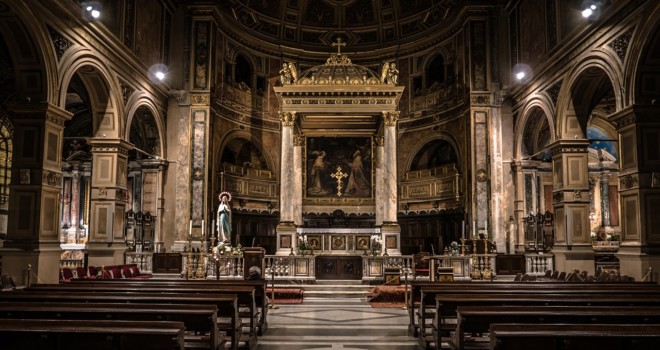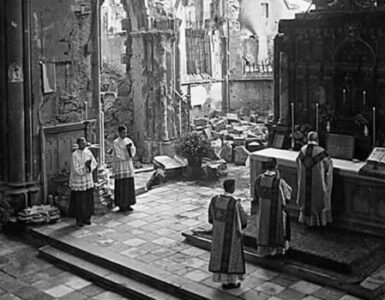“It is necessary, above all in the beginning of our spiritual life, to do certain things at fixed times.”
~ Thomas Merton, OCSO
One of the challenges of getting to daily Mass is the illusion it creates of superior personal piety. Those of us who’ve adopted the practice, though, are under no such illusions. We don’t go to daily Mass because we’re holy; we go to daily Mass because we know we’re not.
Saturday mornings, for me at least, readily demonstrate this reality.
For decades now, I’ve done my best to work daily Mass into my schedule. It was one of the first lessons I learned from Jim, my sponsor, in the months leading up to my reception into the Church. Retired now, Jim served as a public high school teacher in Chicago for many years, which was exacting, exhausting work. He also ran an Uptown soup kitchen twice a week — he still does! — serving hundreds of guests and involving the coordination of scores of volunteers.
Yet, somehow or other, he still gets to church nearly every day. It has been the lifeblood of his spirituality, a foundational discipline that had both fed and formed him. I could see firsthand how the practice was central to who Jim was and what he did: nourishing him as he taught and cared for his students; strengthening him as he managed the controlled chaos of soup kitchen week in and week out; buoying him in the ordinary battles of faith.
Jim would’ve laughed if you’d called him a saint, but his hunger for sanctity was nonetheless palpable. He not only shepherded me into Catholicism, but also became himself a de facto template for how to take it seriously, and central to that was daily Mass. I wanted to be like him, and so I followed his lead. Plus, it just made sense. If it was true, as I’d read in the Council documents, that the Mass was “the fount and apex of the whole Christian life” (LG 11), then why wouldn’t I want to participate in it as often as possible? Sunday Mass was obligatory, I knew, but daily Mass, while optional, was optimal.
Every morning, then, even before I could receive the Eucharist, I’d trudge up Kenmore Avenue to St. Thomas of Canterbury for early Mass. It was like liturgical remediation for this lifelong Evangelical, a daily immersion in the wonder of the Eucharistic drama that I’d been on the edges of for so long. And it increased my hunger for the sacramental communion that awaited me at the Easter Vigil — an augmenting of the long Lenten fast I was experiencing before I could finally feast on the Lord on Holy Saturday.
Yet, it was a different story on all those preceding Saturdays. Herein lies my tale.
Heavily Catholic communities like Chicago are golden for those who frequent daily liturgies. Parishes dot the map everywhere, and each has its own sacramental schedule. Most will have Masses in the morning seven days a week – some at 7:00, some at 8:00 or 8:30, and school parishes will even have them at 9:00 or 10. Then there are the downtown churches (and Catholic hospital chapels) which will frequently feature midday Masses to accommodate the lunchtime crowd. Some parishes will also offer early evening liturgies to catch folks on their way home from work – or to accommodate those whose early morning schedules make it impossible for them to get to daily Mass otherwise.
Hence, getting to weekday Mass is less a matter of schedule coordination than it is a matter of the will. That’s especially the case now that I live in South Bend, which, like Chicago, is very Catholic. But in addition to all the variables I listed above, we also have the University of Notre Dame in our backyard, and there are daily Masses all over campus, morning, noon, and night. It’s an embarrassment of Latin-rite riches such that, if I’m determined to get to Mass Monday through Friday, there’ll undoubtedly be one that fits into my agenda. I just have to get myself there.
But Saturdays?
Saturday Mass is complicated by the fact that it is liturgically encroached by Sunday. That is, the Catholic sabbath, liturgically speaking, begins Saturday evening, so there’s no such thing as a true Saturday evening weekday Mass. Plus, priests and pastors have obligations in preparation for the Sunday celebrations – not the least of which is the preparation of a Sunday homily – and it seems fitting to leave a bit of a liturgical breather between Saturday morning and Sunday vigil Masses. Thus, even Saturday midday Masses are generally cut from weekday schedules.
That leaves Saturday mornings alone for daily Mass habitués, and, in Chicago at least, that was complicated by our frequent Friday night reveries following soup kitchen, often into the wee hours of the morning. So it was that, despite my best intentions, I tended to skip Saturday morning Mass when I lived in the city, which disrupted my daily Mass routine in imitation of Jim. That disruption was perpetuated after I married Nancy and God started blessing us with babies. By the time the end of the week rolled around, getting up early for Saturday morning Mass was a taller order than ever, and over time I simply gave up on the idea.
Recently, however, I’ve made a liberating discovery. It’s been a boost to my spiritual equanimity, and I want to share it with you: The 8:15 a.m. Saturday Mass at St. Anthony’s.
You see, while I don’t have babies around the house any more, my aging frame nonetheless groans mightily when I attempt to rise at the crack of dawn on the weekend. Try as I might (and I’ve tried), I just can’t seem to make it regularly to the Saturday 7:00 at my own parish, or even any of the 8:00 opportunities around town. Maybe that’s sloth, pure and simple, but there’s something about St. Anthony’s 8:15 that helps me get past my inherent indolence.
Perhaps it’s the psychological assurance of that fifteen minutes past the top of the hour – a trick my brain plays on my will to push me beyond my lethargy. “Let’s see,” I’ll tell myself if I roll out of bed at 7:30 a.m. “I can still shower and dress and get there before the Gospel.” That sounds shamefully crass, I know, but it’s enough to get me moving, and I almost always get there in time for the opening rites.
What’s more, I’m not the only one. It seems like the Saturday 8:15 is a magnet for all manner of daily communicants, and not all of them are St. Anthony’s parishioners. Routinely, I spy numerous faces I recognize from other daily Mass hotspots around town – folks who’ve I’ve come to know by sight (if not by name) because we regularly cross paths at St. Patrick’s or the med center during the week. I’ve no idea if their reasons for being there on Saturday morning are similar to mine, but it’s comforting to see them all the same. They’re like my comrades on the spiritual battlefield, and meeting them at St. Anthony’s is like a weekly reunion of yawning saints in the making.
Which is, of course, the point. Daily Mass, like any spiritual discipline, isn’t an end in itself. “The ultimate end of all techniques,” writes Thomas Merton, “is charity and union with God.” If my efforts to get to Mass every day (including Saturdays) should begin to overshadow my commitments to family or interfere with my work – or if, what’s worse, I begin to pharisaically imagine myself somehow holy because of those efforts – then, by all means, I’d best set them aside. Nonetheless, as Merton writes, we all have to employ spiritual discipline of some kind, and it must “have a certain element of severity about it.” He goes on:
If we do not command ourselves severely to pray and do penance at certain definite times, and make up our mind to keep our resolutions in spite of notable inconvenience and difficulty, we will quickly be deluded by our own excuses and let ourselves be led away by weakness and caprice.
For me, participating in Mass every day is that one spiritual discipline I’m resolved to follow whenever possible, and the Saturday 8:15 has become its keystone. Even if you’re not ready to take up a daily Mass discipline yourself, why not join me at St. Anthony’s next weekend and check it out for yourself — maybe adopt it as part of your Lenten discipline. If you’re not in the South Bend area, see if you can find something comparable in your own area. Trust me, you’ll be among friends who won’t think twice about your yawns, and you’ll definitely encounter our Eucharistic Lord no matter what.
Who knows? You just might become a regular.
✠
Image by Mauricio A. from Pixabay












